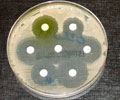DEQ can inhibit the bacterial stress response, revolutionize treatment and protect lives.
- The widespread abuse of antibiotics has caused the evolution of antibiotic-resistant bacteria, leading to a global health crisis
- The misuse and overuse of antibiotics by people have contributed to the emergence of bacteria that are resistant to these drugs
- A recent study discovered a drug called dequalinium chloride (DEQ) that can effectively reduce the development of antibiotic resistance in bacteria
Drugging evolution of antibiotic resistance at a regulatory network hub
Go to source).
A Potential Solution: Inhibiting Bacterial Stress Response
A group of researchers recently published a study on a drug that significantly reduces the ability of bacteria to develop antibiotic resistance. They tested this drug in laboratory cultures and live animal models. The drug works by inhibiting the activation of the stress response in a common gut bacteria called Escherichia coli (E. coli).When E. coli repairs a break in its DNA, it creates new mutations through the stress response. These stress-induced mutations not only make the bacteria resistant to antibiotics but can also lead to mutations that confer resistance to antibiotics that have never been encountered before. Therefore, by blocking this stress response, the drug may prolong the effectiveness of antibiotics.
Senior author Susan Rosenberg, who holds positions at Baylor University, explained that while most bacterial infections can be treated successfully with antibiotics, there are cases where the bacteria develop resistance to the antibiotics, rendering them ineffective in killing the bacteria.
For their study, Professor Rosenberg and her collaborators screened 1,120 drugs approved for human use in the United States and the European Union. They were searching for drugs that could prevent or slow down the evolution of antibiotic resistance in E. coli when exposed to the antibiotic ciprofloxacin (Cipro).
Previous research had shown that low concentrations of ciprofloxacin at the beginning and end of a course of treatment, or when doses were missed, could initiate stress responses in bacteria.
DEQ: The Ultimate Weapon Against Antibiotic Resistance
However, through their experimental screenings, Professor Rosenberg and her team discovered a drug called dequalinium chloride (DEQ) that not only reduced the ability of bacteria to develop antibiotic resistance but was also not an antibiotic itself. This meant that bacteria would not develop resistance to DEQ.Lead author Yin Zhai, a postdoctoral associate in the Rosenberg lab, explained that DEQ met both requirements. When given with Cipro, DEQ reduced the development of mutations that confer antibiotic resistance in laboratory cultures and animal models of infection. Importantly, bacteria did not become resistant to DEQ.
Reference:
- Drugging evolution of antibiotic resistance at a regulatory network hub - (https://pubmed.ncbi.nlm.nih.gov/37352342/)
Source-Medindia
















